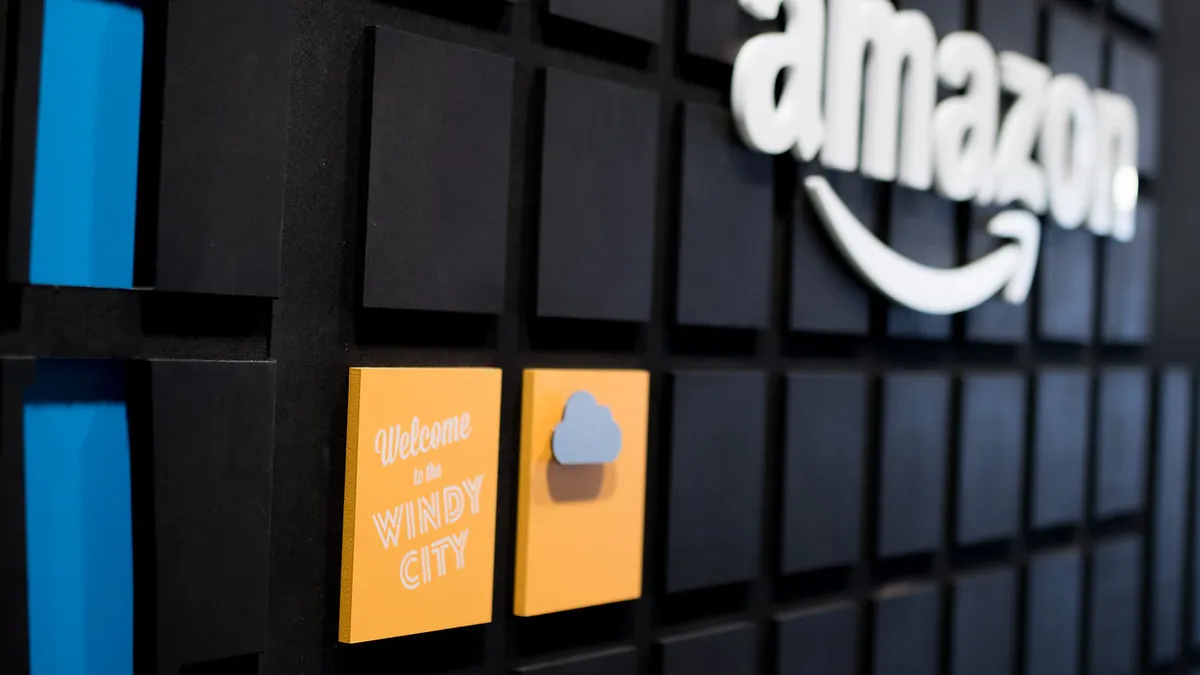Dive Brief:
-
Amazon on Thursday reported that fourth quarter net product sales rose year over year to $50.5 billion from $44.7 billion. For the full year, net product sales rose to $160.4 billion from $141.9 billion in 2018. Net online store sales in the quarter rose 15% year over year to $45.7 billion from $39.8 billion a year ago, as physical store net sales fell 1% to $4.36 billion, according to a company press release. Third-party seller services rose more than 30% to $17.4 billion from $13.4 billion.
-
The e-commerce giant's move to deliver more items in one day helped drive sales, executives said. Fulfillment costs in the quarter rose to $12.2 billion from $10 billion a year ago, as those costs for the full year rose to $40.2 billion from $34 billion.
-
Net income in the quarter rose to $3.3 billion from $3 billion a year ago; for the year, net income rose to $11.6 billion from $10 billion. In a statement, Amazon founder-CEO Jeff Bezos noted the company now has more than 150 million paid Prime members globally. More customers signed up for Prime in the fourth quarter than in any previous one, CFO Brian Olsavsky said on a conference call with analysts Thursday.
Dive Insight:
Retail represents just a portion of Amazon's overall operations, and well over half of the merchandise it does sell comes from third-party sellers on its Marketplace. Its total fourth quarter net sales, which include not just retail but also its highly profitable cloud sales, plus advertising and other revenue streams, rose 21% to $87.4 billion, as annual 2019 net sales rose 20% to $280.5 billion.
The diversity of its operations and the support it gets from its AWS cloud unit set it apart from other retailers, which don't enjoy such cushions, and make experimentation and investments that much easier, a situation that keeps rivals on their toes.
In fact, the company's move to speed up its delivery to just a day appears to be changing consumer behavior, as it has before, and is granting it yet more share in retail, especially in North America where sales increased 21.6% in the quarter, according to emailed comments from Telsey Advisory Group analyst Joseph Feldman. Walmart and Target have risen to the challenge, leveraging their stores to speed up fulfillment, but other retailers, with less capital, are hampered in such efforts, he warned.
"The company's customer-centric approach, pursuit of efficiency, strong and growing Prime membership, and advanced technology have differentiated it and made it a preferred shopping destination," he wrote. "Importantly, the solid growth and profitability of AWS, as well as new media and advertising offerings, should continue to outperform the company average and support investment in Retail."
But it's not just retail. In the next 18 months, Amazon will be sitting comfortably as "the world's #1 Retailer, #2 Software company, and #3 Advertising company," according to a client note from MKM Partners Executive Director Rohit Kulkarni. "Coupled with ongoing investments in last-mile delivery, we think Amazon Logistics has already eclipsed FedEx, and could eclipse UPS in the next five years. With more than 150 [million] paid Prime subs, Amazon could eclipse Netflix too."
That won't come cheap. Fulfillment costs have ballooned thanks to Amazon's efforts to speed up delivery. Olsavsky said that the company is working to bring more one-day delivery abroad as well, focusing first on Europe and Japan.
"They'll continue to spend money, up to a billion a quarter it appears, to finish the US and then head internationally with 1-day shipping, and that's the really interesting thing to me," Jon Reily, senior vice president and global head of commerce strategy for digital agency Isobar, told Retail Dive in an email. "They have a fair amount of competition here in the US in the shipping wars, Walmart and Target have both stepped up their games there, but no one internationally can touch that. They will be the dominant force in Europe for half a decade if they can pull that off, and Asia isn't far behind."
Amazon's tagline as "the everything store" isn't just about having an "endless aisle" of merchandise and its ambitions likely go beyond shipping, too, according to Doug Stephens, author of "Reengineering Retail: The Future of Selling in a Post-Digital World," who has singled out the company's shipping potential for years. The company already provides more than half of its own shipping needs and is set to provide all of it within two to three years, according to Stephens. Providing shipping to other businesses, including other retailers, is the logical next step, and a lucrative one, he said.
Given that, and noting where Amazon derives so much of its sales and even more of its profits, is it even a "retailer"?
"I've always maintained that Amazon's superpower is that it's not a retailer but rather a data, technology and innovation company that happens to offer almost half a billion products," Stephens told Retail Dive in an email. "Retail is merely the Trojan Horse used to initiate the relationship between itself and consumers but the real prize isn't selling commodity products. The true ambition of Amazon is to become our bank, our insurance company, our health care provider — our 'everything store.' Shipping will be Amazon's next AWS."















